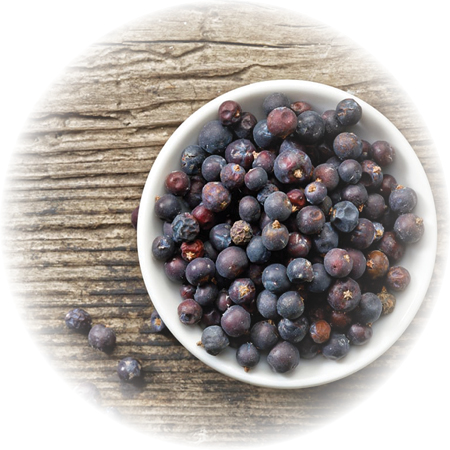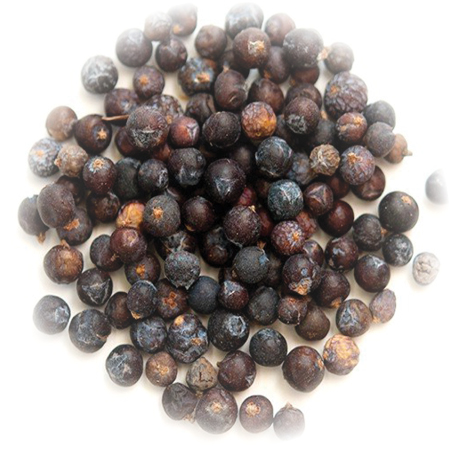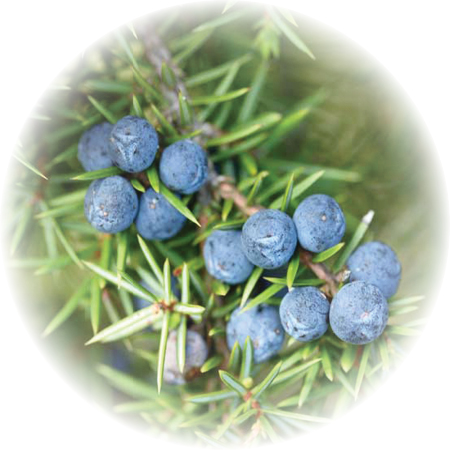Juniper Berries, Whole (Juniperus communis) – Dried Herb, Organic
$11.58 – $115.80
Juniper is a small coniferous evergreen tree or dense shrub, ranging from around 10 metres tall to a low-lying spreading shrub in exposed locations. Juniper leaves are sharply pointed, ranging in dark green to blue green. This plant is native to cool, temperate parts of North America, Europe, and Asia. Most Junipers are classified as dioecious, which means that male and female plant parts occur on separate plants. The male pollen cones are small and almost unnoticeable until they turn yellow when they produce pollen. Whereas, the female juniper plants make the cones that produce seeds and are more easily identified because they turn blue and look like a berry.
Pollination occurs in spring when cones mature in the second or third year. During the blooming season from January to April and sometimes there is a second bloom in the fall. Copious quantities of pollen from the male junipers cause allergic reactions in many people. Juniper is the world’s most widespread genus in the Cupressaceae family also known as the Cypress family, which includes other Cypress trees and Redwood trees.
The history of Juniper dates to the Egyptian papyrus in 1500 BCE, and Juniper was a symbol of the Canaanites’ fertility goddess Ashera or Astarte in Syria. In the Bible’s Old Testament, a Juniper with an angelic presence sheltered the prophet Elijah from Queen Jezebel’s pursuit. In Western European folklore, a Juniper tree is planted by the door of a home so a witch cannot enter. Incense made from Juniper had been used by the Scottish folklore to ward off the evil eye. Commercially Juniper cones have used since the early 18th century as flavouring agents in beers, liqueurs – including gin and alcoholic bitters.
Many Indigenous tribes of North America have traditionally used Juniper Berries, including the Blackfoot tribe who made a decoction of the blue seed cones for congestion in the lungs. The Woodland Cree smoked the blue seed cones for asthma and made a decoction of the green berries for a sore back associated with kidney problems. The Inupiat have used the blue cones alone and combined with needles and twigs to prevent and treat colds and flu. The Hanaksiala made poultices of the branch and blue cones and applied this to wounds and cuts.
In Western traditional medicine, Juniper has been used to relieve indigestion, stimulate the appetite, for cystitis, minor urinary tract issues and intestinal worms. Juniper oil has been used in topical ointments to relieve aching joints and muscles and as a steam inhalation for bronchitis.
Properties:
The taste and energetics of Juniper are bitter, pungent, sweet, hot, drying and astringent. Juniper has an affinity to the digestive system, respiratory system, urinary tract, kidneys, musculoskeletal system, immune system and skin. For minor bladder complaints make a tea by blending Juniper with Uva ursi, Corn silk, Marshmallow Root, Cleavers or Yarrow. For a respiratory tea combine Juniper with Sage, Thyme, Rosemary, Eucalyptus Leaf or Elecampane Root.
How to use:
Gently crush the Juniper Berries right before making tea. Use 1 teaspoon of Juniper to one cup of boiling water. steep for 15 minutes, strain and drink up to two cups a day.
Use as an inhalation for respiratory system.
Cautions & contraindications:
People should not use Juniper when they have kidney impairment, liver conditions, are taking medication for diabetes and pregnancy or breastfeeding.
This information is for educational purposes only and is not intended to diagnose, treat or cure any disease or illness. Please consult your health care provider prior to the use of this product if you are pregnant, nursing, taking medications or have a medical condition. Individual results may vary.



Reviews
There are no reviews yet.